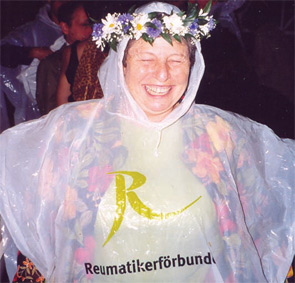Since the initial research project (a randomized trial that revealed better outcomes and lower costs for patients who underwent the educational component of the plan1), the two have collaborated on designing the Arthritis Self-Management Program and the subsequent Chronic Disease Self-Management Program, and have contributed to development of the Chronic Care Model of practice created by the Improving Chronic Illness Care program of the Robert Wood Johnson Foundation.
Staying at Stanford
From 1978 until 1987, Dr. Lorig was a research associate at the Stanford Arthritis Center, School of Medicine. She was a senior research scientist from 1987 to 1995; an associate professor from 1995 to 2002, and a full professor in the division of immunology and rheumatology of the department of medicine at Stanford from 2002 onward. Since 1985, she has also served as clinical associate professor in the School of Nursing at the University of California, San Francisco. Diana Laurent, MPH, a Patient Education Center staff member who develops curriculum materials and maintains the Center’s Web site and chronic disease, arthritis, and diabetes online projects, notes that finding a fit within the School of Medicine was not always easy. “They [the administration] dealt with clinical personnel as opposed to people doing health education. They didn’t exactly know what to do with us—in the early days, Kate’s job title was actually ‘miscellaneous professional’!”
Given Dr. Lorig’s initial reluctance to work with arthritis, what changed her mind and resulted in her 30-year career at Stanford? “I did the first project, and then two things happened,” she recalls. “I began to truly understand that arthritis is a surrogate for all chronic illness. Hal and Jim Fries [initiator of ARAMIS] were always so eloquent in talking about the coming crisis in chronic illness, which was not something that I’d ever considered much before.” The other reason was the Robert Wood Johnson Clinical Scholars Program: “Since I didn’t have any nursing colleagues at Stanford, I was really a poor fit. The clinical scholars became my colleagues and my playmates—they were just such a remarkable, remarkable group of people!” And finally, she says: “I couldn’t find anything I wanted to do more.”

Stature as a Scientist
Dr. Lorig has spent a career dedicated to interventional studies with practical applications and practical value to those living with chronic diseases, notes Nancy Whitelaw, PhD, senior vice president for the National Council on Aging (NCOA) and director of the Center for Healthy Aging, both in Washington, D.C., who describes Dr. Lorig as “one of my heroes!” Dr. Whitelaw explains, “The questions she’s asking in her science are about issues and problems that are real to people. Her work is informed by strong theory that she interprets and puts into place in very appropriate ways.” In addition, she says, Dr. Lorig has the “guts and commitment” to put together a national training program, complete with all the tools and materials, that enables organizations to acquire the necessary skills to replicate her interventions. “It’s not easy, in this world of medicalization that we live in, to be passionate about self-care and self-management. But then, you know, she is no shrinking violet!” she notes.
